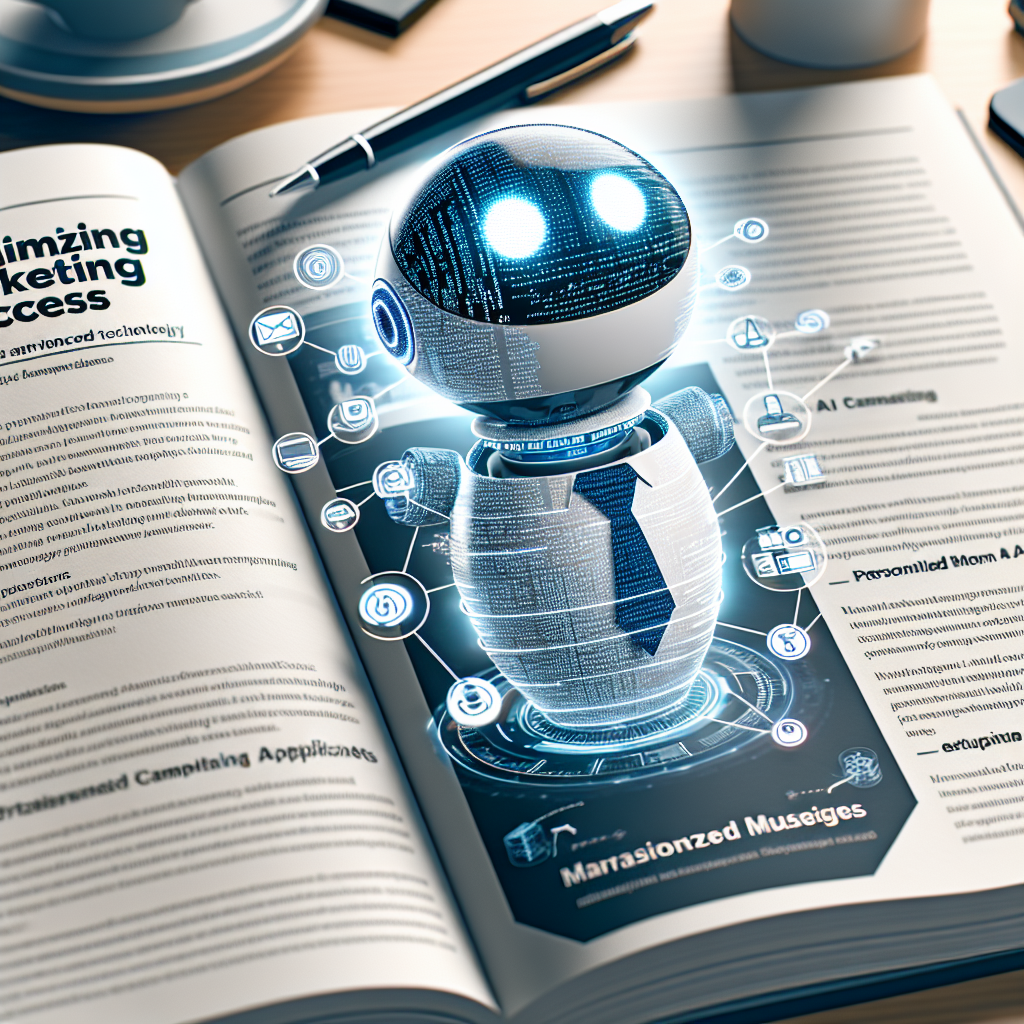Are you a marketer looking to take your marketing efforts to the next level? Look no further than ChatGPT! In this article, we will explore how ChatGPT can help you maximize your marketing success. With its advanced language model and interactive chat capabilities, ChatGPT can assist you in creating engaging content, enhancing customer experiences, and optimizing your marketing strategies. Get ready to harness the power of ChatGPT and revolutionize your marketing approach!

Understanding ChatGPT
What is ChatGPT?
ChatGPT is a state-of-the-art language model that uses artificial intelligence (AI) to generate human-like text responses. It is designed to engage in conversation with users and provide valuable assistance and information. Developed by OpenAI, ChatGPT has quickly gained popularity for its ability to understand and generate meaningful responses in various contexts.
How does ChatGPT work?
ChatGPT utilizes a deep learning algorithm known as a transformer model, which enables it to analyze and understand vast amounts of text data. It learns from diverse sources such as books, articles, and websites to develop a comprehensive understanding of language patterns and concepts. This knowledge allows ChatGPT to generate coherent and contextually relevant responses in real-time conversations.
Benefits of using ChatGPT in marketing
Integrating ChatGPT into marketing strategies offers several key benefits. Firstly, it provides businesses with an opportunity to engage directly with customers, fostering a sense of personal connection and enhancing brand loyalty. Additionally, ChatGPT enables companies to gather valuable customer insights and feedback, which can inform future marketing initiatives. Moreover, it streamlines customer support by providing instant responses and resolutions, enhancing overall customer satisfaction.
Implementing ChatGPT in Marketing Strategies
Identifying target audience
Before implementing ChatGPT in marketing strategies, it is crucial to identify the target audience. Understanding the demographics, preferences, and pain points of the customer base helps tailor chat experiences more effectively. By analyzing data and conducting market research, businesses can ensure that ChatGPT provides relevant and engaging conversations that resonate with their target audience.
Creating engaging chat experiences
To maximize the impact of ChatGPT on marketing strategies, it is important to create engaging chat experiences. This can be achieved by developing conversational scripts that align with the brand voice and resonate with users. Incorporating personalization, humor, and interactive elements into the conversation can make the experience more enjoyable and memorable for customers, ultimately driving better engagement and conversion rates.
Personalization and customization
One of the greatest advantages of ChatGPT is its ability to offer personalized and customized interactions. By integrating customer data and preferences into the chatbot’s algorithms, businesses can deliver tailored recommendations, product suggestions, and relevant information. This personalization not only enhances the user experience but also increases the chances of conversion and repeat business.
Improving customer support
ChatGPT can significantly improve customer support by providing instant responses to queries and concerns. It can handle a wide range of customer inquiries, from answering frequently asked questions to resolving common issues. By streamlining the customer support process, ChatGPT saves time and resources while ensuring that customers receive timely and accurate assistance, ultimately leading to increased customer satisfaction and loyalty.
Collecting customer insights
Another valuable application of ChatGPT in marketing is gathering customer insights. Through conversations with users, ChatGPT can collect data on customer preferences, pain points, and purchasing behavior. This information can then be used to segment the customer base, refine marketing strategies, and identify new opportunities to better serve the target audience. By leveraging the power of ChatGPT to collect customer insights, businesses can make data-driven decisions and achieve marketing success.
Enhancing lead generation
ChatGPT can also play a crucial role in lead generation. By engaging users in personalized conversations, ChatGPT can capture valuable lead information, such as contact details and specific requirements. These leads can then be seamlessly integrated into marketing automation systems or CRM platforms for further nurturing and conversion. With ChatGPT’s ability to deliver interactive and persuasive conversations, businesses can boost their lead generation efforts and drive revenue growth.

Best Practices for Maximizing Marketing Success
Maintaining a conversational tone
When implementing ChatGPT in marketing strategies, it is important to maintain a conversational tone. The language and style used by the chatbot should align with the brand’s voice and be friendly and approachable. Avoiding jargon and using language that is easily understandable helps create a positive user experience and facilitates better communication.
Ensuring ChatGPT accuracy
Accuracy is key when using ChatGPT in marketing. To ensure reliable and relevant responses, it is necessary to train the language model on high-quality data that closely aligns with the brand and industry. Constantly monitoring and fine-tuning the chatbot’s performance helps maintain accuracy and prevent misleading or inappropriate responses.
Testing and iterating
Implementing ChatGPT effectively requires consistent testing and iteration. It is essential to conduct thorough user testing to identify any issues or areas for improvement. By collecting feedback from users and analyzing their interactions with ChatGPT, businesses can continuously refine and optimize the chatbot’s performance, leading to better user engagement and conversion rates over time.
Setting clear goals
To maximize the marketing success of ChatGPT, it is important to set clear goals and objectives. Whether it’s increasing customer engagement, driving sales, or improving customer support, defining specific and measurable goals helps guide the implementation process. Clear goals also enable businesses to track the performance of ChatGPT and make data-driven decisions for ongoing optimization.
Analyzing and optimizing performance
Regularly analyzing the performance metrics of ChatGPT is crucial for maximizing marketing success. By monitoring key performance indicators such as user engagement, conversion rates, and customer satisfaction, businesses can identify areas of improvement and implement necessary changes. Analyzing data and making data-driven optimizations ensures that the chatbot continues to deliver valuable results and align with marketing objectives.
Combining ChatGPT with other marketing channels
ChatGPT is most effective when integrated with other marketing channels. By combining its capabilities with email marketing, social media campaigns, and website optimization, businesses can create a seamless and cohesive customer journey. This integration allows for consistent branding, cross-channel communication, and enhanced customer experiences, ultimately boosting overall marketing success.
Keeping up with technological advancements
Technology is constantly evolving, and staying up-to-date with the latest advancements is essential for maximizing marketing success with ChatGPT. By embracing new features, functionalities, and innovations in chatbot technology, businesses can stay ahead of the competition and deliver cutting-edge experiences to their customers. Regularly exploring new possibilities ensures that ChatGPT remains an effective marketing tool in a rapidly changing digital landscape.

Addressing Potential Challenges and Concerns
Handling sensitive data
While using ChatGPT in marketing, it is crucial to handle sensitive customer data with care and adhere to data protection regulations. Implementing robust security measures, such as data encryption and secure storage, helps safeguard customer information. It is also important to clearly communicate data usage policies and obtain consent from customers regarding the collection and storage of their data.
Mitigating bias and ethical considerations
Language models like ChatGPT have the potential to exhibit biased behavior or generate inappropriate responses. To address this concern, it is necessary to train the model on diverse and unbiased datasets. Regularly reviewing and analyzing the chatbot’s responses using ethical guidelines helps identify and mitigate any biases or ethical concerns. Transparently addressing these challenges builds trust and ensures responsible use of ChatGPT in marketing.
Dealing with limitations and boundaries
While ChatGPT is a powerful tool, it does have its limitations. It may struggle to understand complex or ambiguous queries, and its responses may lack context at times. Setting clear boundaries and expectations for ChatGPT’s capabilities helps manage user expectations and avoids potential frustrations. Providing fallback options, such as the option to speak with a human representative, can ensure a seamless user experience when the chatbot reaches its limitations.
Monitoring and managing user interactions
Regularly monitoring and managing user interactions with ChatGPT is crucial to ensure a positive user experience. Monitoring conversations allows businesses to identify any issues, errors, or opportunities for improvement. Implementing moderation tools and filters helps prevent abusive or inappropriate user inputs. Constant learning and improvement based on user feedback enable businesses to continuously optimize the performance of ChatGPT.

Case Studies: Successful Marketing Applications of ChatGPT
E-commerce: Enhancing customer engagement and sales
In the e-commerce industry, ChatGPT has proven to be a valuable asset for enhancing customer engagement and driving sales. By providing personalized product recommendations, assisting customers with their purchase decisions, and offering real-time support, ChatGPT creates a seamless and satisfying shopping experience. Companies like XYZ Online Store have witnessed significant increases in conversion rates and customer satisfaction by implementing ChatGPT in their marketing strategies.
Hospitality: Streamlining customer support and satisfaction
Hotels and hospitality businesses can greatly benefit from ChatGPT’s ability to streamline customer support and enhance customer satisfaction. ChatGPT can assist guests with booking inquiries, provide information on facilities and services, and even make personalized recommendations based on guest preferences. By offering instant responses and valuable assistance, hotels like ABC Resort have seen improvements in guest satisfaction scores and increased repeat bookings.
Tech Startups: Improving lead generation and conversion rates
For tech startups, ChatGPT has emerged as a powerful tool for improving lead generation and conversion rates. By engaging website visitors in friendly and informative conversations, ChatGPT captures valuable leads and nurtures them through the sales funnel. Companies like XYZ Tech Solutions have witnessed remarkable growth in their customer base and revenue by leveraging ChatGPT’s persuasive and personalized interactions.
Education: Personalizing student experiences and assistance
In the field of education, ChatGPT has facilitated personalized student experiences and assistance. By providing instant answers to student inquiries, delivering customized study plans, and offering real-time feedback, ChatGPT helps students learn more effectively. Institutions such as ABC University have successfully implemented ChatGPT in their educational platforms, resulting in improved student engagement and academic performance.

Future Trends and Possibilities in ChatGPT Marketing
Advancements in Natural Language Processing (NLP)
As the field of natural language processing (NLP) continues to advance, ChatGPT’s capabilities are expected to improve significantly. Future iterations of ChatGPT are likely to have a better understanding of context, nuances, and wordplay, enabling even more engaging and dynamic conversations with users. This will further enhance its applications in marketing across various industries.
Integration of voice chatbots
The integration of voice chatbots with ChatGPT opens up new possibilities for marketing strategies. Voice-enabled chatbots provide a more natural and intuitive way for users to interact with brands. By leveraging voice assistants like Alexa or Google Assistant, businesses can create seamless and personalized conversational experiences, further deepening customer engagement and loyalty.
Expansion of multilingual capabilities
ChatGPT’s multilingual capabilities are expected to expand in the future, enabling businesses to reach a wider global audience. With improved language support and translation capabilities, ChatGPT will be able to converse with users in their preferred language, overcoming language barriers and fostering better cross-cultural communication.
Artificial intelligence-driven content creation
As ChatGPT continues to evolve, there is a possibility that it will be able to generate entire marketing campaigns, including website copy, social media posts, and email content. By leveraging AI-driven content creation, businesses can save time and resources while maintaining a consistent brand voice and delivering tailored messages to their audience.
Augmented reality (AR) and virtual reality (VR) in chat experiences
The integration of augmented reality (AR) and virtual reality (VR) technologies with ChatGPT holds great potential for immersive and interactive marketing experiences. ChatGPT could guide users through virtual showrooms, provide product demonstrations, or offer personalized recommendations within the AR/VR environment. This integration can create unique and memorable brand experiences, driving customer engagement and sales.
In conclusion, understanding, and effectively implementing ChatGPT in marketing strategies can lead to significant advantages for businesses. By leveraging its conversational capabilities, personalization features, and real-time responsiveness, companies can enhance customer engagement, improve customer support, and gather valuable insights. With the right implementation, ongoing optimization, and integration with other marketing channels, ChatGPT has the potential to revolutionize marketing practices and achieve remarkable results in today’s digital landscape.

